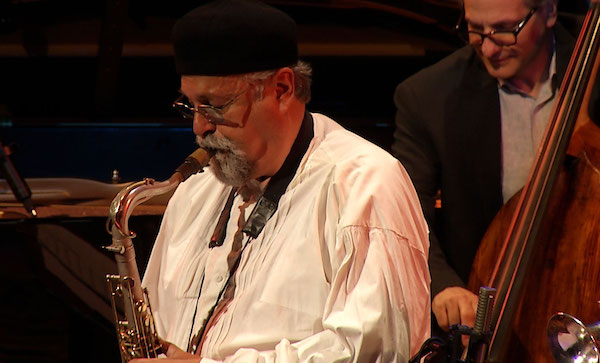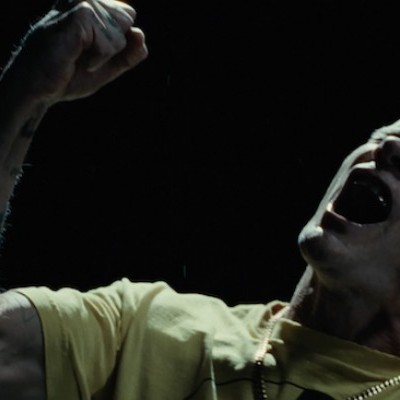Dec 9, 2025 12:28 PM
In Memoriam: Gordon Goodwin, 1954–2025
Gordon Goodwin, an award-winning saxophonist, pianist, bandleader, composer and arranger, died Dec. 8 in Los Angeles.…

Joe Lovano’s new ensemble, Universal Jazz Ensemble, premiered in the Appel Room at Jazz at Lincoln Center on Oct. 18.
(Photo: Courtesy of Jazz at Lincoln Center)On hearing about Joe Lovano’s new septet, Universal Jazz Ensemble, his legion of longtime fans were struck by a sense of déjà vu. Beyond invoking universality in its name, the new group recalls the multireedist’s mid-1990s Universal Language septet, employing vocals, brass, woodwinds, strings and percussion.
The feeling was stoked when the new band hit the stage for its Oct. 18 debut at Jazz at Lincoln Center. First, two key members of the old ensemble—vocalist Judi Silvano and pianist Kenny Werner—took their places to Lovano’s right. Then, Lovano announced that the group would be playing a staple of the Universal Language repertoire, “The Dawn Of Time.”
But the feeling of familiarity faded quickly. “Dawn” was no longer a stand-alone piece. Rather, it was incorporated into a suite with three other movements, its signature descending scale transformed from the melodic core of a lush ballad, with Lovano’s tenor saxophone in the lead, to the central pattern around which he and the other members of the front line—Silvano and cornetist Graham Haynes—weaved overlapping melodies that served the suite’s aesthetic.
Truth be told, during this 90-minute debut performance—the first of four sets in the Appel Room during two consecutive nights—individual tunes largely yielded their primacy to the ebb and flow of the musical presentation. As all manner of instrumental combinations came together, they spun a sonic throughline that shifted constantly in time, tone and texture, building moments that either dissolved in the ether or coalesced into the elements of a sustained narrative. The set was clearly one to be experienced holistically.
Lovano, a vision in flowing black and white garb—all the better, metaphorically speaking, to form a neutral backdrop for the multitude of musical colors swirling around him—cut a kinetic figure who, with a wave of his hand or a knowing glance, urged on his front line. And they responded in spades, Silvano and Haynes—both formidable foils—supplying an unending stream of asymmetrical counterpoint to the leader’s otherworldly outpourings.
Behind the three musicians, the redoubtable John Patitucci—another longtime Lovano associate who evinced a dead-on-serious sense of time and devastating technique even as he took on a joyous, even mischievous, presence on stage—offered characteristically nimble turns on bass. Operating with gravitas in both arco and pizzicato modes, he anchored the onstage assemblage when its balance seemed most at risk.
Contributing chordal ballast—and, when called on, persuasive solo excursions—were a powerfully percussive Werner and, on electric guitar, an adroitly lyrical Liberty Ellman, who traces his collaborations with Lovano to the Village Rhythms Band, a quintet that was active about five years ago.
That band specialized in West Africa-inflected rhythms, providing spiritual fodder for the debut performance. From the stage, Lovano explained that both the opener (“29 On The 29th”) and closer (“Congregation At Tafawa Balewa Square”) took inspiration from early 1980s cultural exchanges he enjoyed in Nigeria. And, as it turned out, both proved to be solid vehicles for the churning colloquies that developed between the two drummers, Andrew Cyrille and Tyshawn Sorey.
While featuring a pair of drummers in his ensemble is nothing new for Lovano, Cyrille and Sorey are separated in age by four decades. That generational split, coupled with their personal predilections, was reflected in contrasting but complementary approaches: Cyrille the more open player, leaning on craft to build sequences based on negative space; Sorey the younger and more animated player, offering figures that filled the holes with dense, rich commentary.
Playing alone or together, the drummers delivered more than their share of spectacle. But ultimately, it was Lovano’s night. Raising his tenor and G mezzo-soprano saxes high against the lights of Central Park South gleaming through the windows, he soared as expansively and expressively as ever—his effusions conjuring a universe of sound as generous as the man himself. DB

Goodwin was one of the most acclaimed, successful and influential jazz musicians of his generation.
Dec 9, 2025 12:28 PM
Gordon Goodwin, an award-winning saxophonist, pianist, bandleader, composer and arranger, died Dec. 8 in Los Angeles.…

Belá Fleck during an interview with Fredrika Whitfield on CNN.
Jan 13, 2026 2:09 PM
The fallout from the renaming of the John F. Kennedy Center for the Performing Arts to include President Donald…

The success of Oregon’s first album, 1971’s Music Of Another Present Era, allowed Towner to establish a solo career.
Jan 19, 2026 5:02 PM
Ralph Towner, a guitarist and composer who blended multiple genres, including jazz — and throughout them all remained…

Flea has returned to his first instrument — the trumpet — and assembled a dream band of jazz musicians to record a new album.
Dec 2, 2025 2:01 AM
After a nearly five-decade career as one of his generation’s defining rock bassists, Flea has returned to his first…

Rico’s Anti-Microbial Instrument Swab
Jan 19, 2026 2:48 PM
With this year’s NAMM Show right around the corner, we can look forward to plenty of new and innovative instruments…